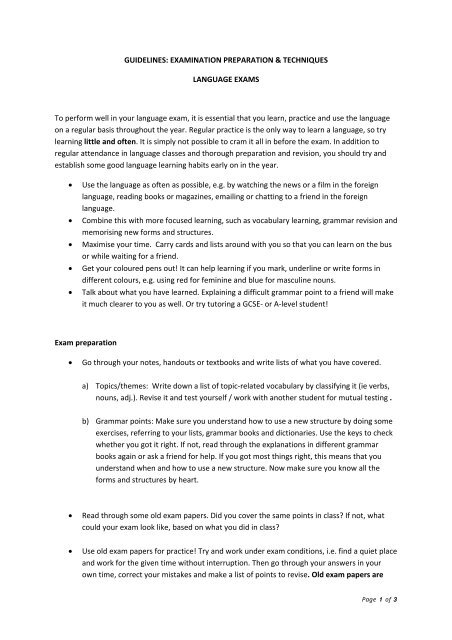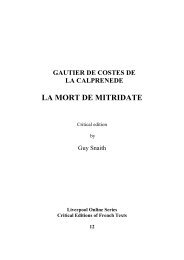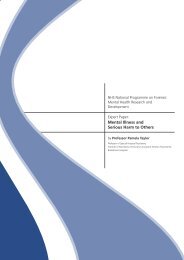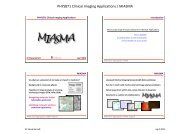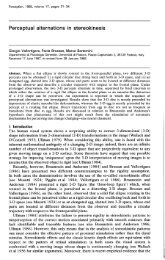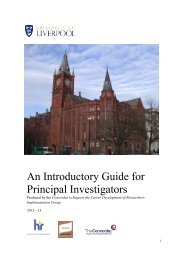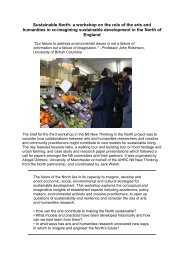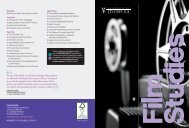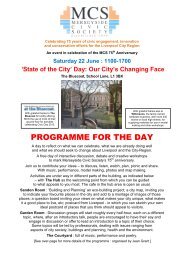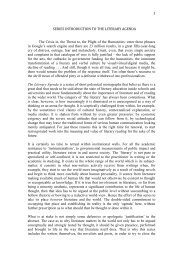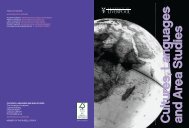GUIDELINES: EXAMINATION PREPARATION & TECHNIQUES ...
GUIDELINES: EXAMINATION PREPARATION & TECHNIQUES ...
GUIDELINES: EXAMINATION PREPARATION & TECHNIQUES ...
Create successful ePaper yourself
Turn your PDF publications into a flip-book with our unique Google optimized e-Paper software.
<strong>GUIDELINES</strong>: <strong>EXAMINATION</strong> <strong>PREPARATION</strong> & <strong>TECHNIQUES</strong><br />
LANGUAGE EXAMS<br />
To perform well in your language exam, it is essential that you learn, practice and use the language<br />
on a regular basis throughout the year. Regular practice is the only way to learn a language, so try<br />
learning little and often. It is simply not possible to cram it all in before the exam. In addition to<br />
regular attendance in language classes and thorough preparation and revision, you should try and<br />
establish some good language learning habits early on in the year.<br />
• Use the language as often as possible, e.g. by watching the news or a film in the foreign<br />
language, reading books or magazines, emailing or chatting to a friend in the foreign<br />
language.<br />
• Combine this with more focused learning, such as vocabulary learning, grammar revision and<br />
memorising new forms and structures.<br />
• Maximise your time. Carry cards and lists around with you so that you can learn on the bus<br />
or while waiting for a friend.<br />
• Get your coloured pens out! It can help learning if you mark, underline or write forms in<br />
different colours, e.g. using red for feminine and blue for masculine nouns.<br />
• Talk about what you have learned. Explaining a difficult grammar point to a friend will make<br />
it much clearer to you as well. Or try tutoring a GCSE‐ or A‐level student!<br />
Exam preparation<br />
• Go through your notes, handouts or textbooks and write lists of what you have covered.<br />
a) Topics/themes: Write down a list of topic‐related vocabulary by classifying it (ie verbs,<br />
nouns, adj.). Revise it and test yourself / work with another student for mutual testing .<br />
b) Grammar points: Make sure you understand how to use a new structure by doing some<br />
exercises, referring to your lists, grammar books and dictionaries. Use the keys to check<br />
whether you got it right. If not, read through the explanations in different grammar<br />
books again or ask a friend for help. If you got most things right, this means that you<br />
understand when and how to use a new structure. Now make sure you know all the<br />
forms and structures by heart.<br />
• Read through some old exam papers. Did you cover the same points in class? If not, what<br />
could your exam look like, based on what you did in class?<br />
• Use old exam papers for practice! Try and work under exam conditions, i.e. find a quiet place<br />
and work for the given time without interruption. Then go through your answers in your<br />
own time, correct your mistakes and make a list of points to revise. Old exam papers are<br />
Page 1 of 3
kept in the Short Loan section in the Sydney Jones library and/or in the SOCLAS Library<br />
(Portuguese Class tests).<br />
• Do try and get a good nights’ sleep before the exam. Have a good breakfast/lunch and arrive<br />
at the examination venue in good time.<br />
Exam technique (written exams)<br />
Read the questions and instructions carefully and estimate the time you need for each question. Use<br />
the weighting of each question as a guide, if possible. Stick to the time you set yourself for each task,<br />
and come back to a question if you find you have time in the end.<br />
1. Reading comprehension:<br />
• Read the text quickly to see what it is about. Don’t go into detail at this stage, and don’t<br />
spend much time on difficult parts.<br />
• Don’t panic if you feel you don’t understand much. Difficult texts can come with very easy<br />
questions and easy texts can come with more searching ones!<br />
• Read the questions and answer them reading the relevant parts of the text as closely as<br />
necessary. Don’t spend too much time on parts of the text which are not relevant to your<br />
answers.<br />
2. Writing:<br />
• Read the question very carefully.<br />
• Make a short plan of what you are going to write and make sure it is relevant to the<br />
question. It helps if you consider at this stage what you are able to write about in terms of<br />
vocabulary, grammatical structures etc., as long as you answer the question.<br />
• Write your answer. Has your answer taken into account the full title?<br />
• Leave sufficient time to check your work. Go over your text at least two times, checking for<br />
different mistakes each time. For example, if you tend to make mistakes with verb endings,<br />
tenses etc., check these first, then move on to declension of nouns and adjectives, or<br />
sentence structure etc.<br />
3. Grammar:<br />
• Think of what you have learned in class about each grammar question.<br />
• Answer the questions.<br />
• If an answer doesn’t take much time, such as gaps, don’t leave them blank, even if you don’t<br />
know. You may just be lucky!<br />
4. Listening:<br />
• If you know the topic or title of the text, think of what you know about the topic, what you<br />
expect from the text and which vocabulary may come up.<br />
• If you have time, read the questions first. This will focus your listening.<br />
Page 2 of 3
• Make sure you know how often you are going to listen to the text.<br />
• If you can listen to a text more than once, use the first listening to answer the questions and<br />
the second one to check your answers and tackle missed questions.<br />
• Don’t panic! Focus on the things you DO understand.<br />
Oral exams:<br />
• To prepare for an oral exam, talk to yourself and have some practice runs with a friend. This<br />
will prepare you for the kind of question you may be asked.<br />
• Learn some useful phrases in advance, such as ‘Can you please repeat the question?’, ‘I<br />
don’t understand the question’, ‘I don’t understand this part of the text’ etc.<br />
• Prepare some holding expressions, such as ‘Well, let me see’, or ‘in my opinion…’, to give<br />
you time to formulate your thoughts during the exam.<br />
• If you receive a question paper or a topic in advance, prepare thoroughly.<br />
• If you are allowed to bring notes with you, never write full sentences, but note down bullet<br />
points and, if allowed, useful structures and difficult vocabulary only. Examiners are<br />
assessing a spontaneous use of the language, so reading out would not get you marks. You<br />
need to be prepared for a degree of variation or unpredictability, according to the level of<br />
competence you are expected to have reached.<br />
• If you get a fixed preparation time, make sure that you think about all the questions you are<br />
going to address. Don’t spend all your time on the first one.<br />
• The first minute or so is often used for greetings and to make you feel comfortable. Relax<br />
and smile!<br />
• Remember that the oral exam is basically a conversation between you and the examiner. If<br />
you don’t understand a question, please say so. Do not freeze!<br />
• Follow the briefing given by your tutor and note special instructions.<br />
• You are part of a series of appointments – please make sure you arrive in good time.<br />
Page 3 of 3


